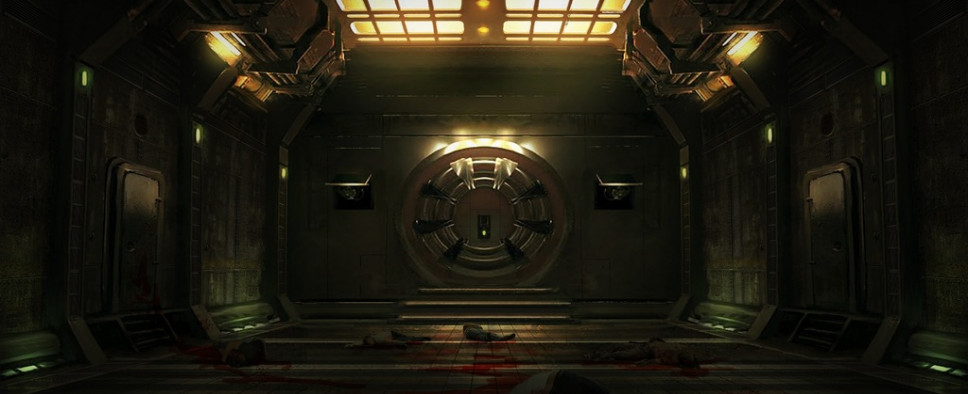The New World Update #29
-
Category: News ArchiveHits: 1316

The latest development update for Iron Tower Studio's colony ship RPG The New World focuses on Vince D. Weller's approach to writing dialogue, the game's conflicts, and the importance of choices and consequences. The update also features a few paragraphs from Mark Yohalem, a prominent video game writer and developer, where he offers some constructive criticism for The New World, so there's a lot of good stuff there. An excerpt:
As you probably know by now, Choices & Consequences are more than just a feature for us. It’s the foundation on which the game is built and a concept we’ll continue exploring and evolving as long as we stay in business. The reason it’s so important to us –and hopefully to you – is that the players need a steady stream of choices to craft their own tales and it is the consequences that give meaning to those choices and alter the tale.
AoD was our first attempt at C&C and I’d rate this attempt at 6/10. We did many things right and – predictably - we did many things wrong. We also learned quite a lot in the process and we hope that The New World will take C&C to the next level, offering a less restrictive and more engaging experience.
Essentially, there are 3 types of choices:Since Big Decisions are appropriately rare (you can’t alter the storyline every 5 min) and multiple quests solutions are often determined by your build, the meat of the game is taking sides in conflicts, which is a lot more complex than pointing at some ruins and saying ‘there be monsters’.
- Multiple quest solutions to let you handle quests in a manner fitting your character. Keep in mind that you will not be able to handle every situation (aka side quest) with brute force or clever words, so some exceptions will apply, but you will be able to beat the game with combat, stealth, or diplomacy.
- Taking sides in various conflicts, big and small, thus leaving your mark on the gameworld and defining your character through actions (aka role-playing). These decisions aren't based on skills but on your opinions, allegiances, beliefs, past decisions, etc. It works best when there’re plenty of double- and triple-crossing opportunities, like going to kill Lorenza in one of the assassins quest in Maadoran and letting her talk you into killing Darista and Gaelius instead, which affects your options with Hamza when you run into him in Ganezzar.
- Big Decisions that alter the story (i.e. branching), affect the gameworld, and have far reaching consequences.
First and foremost, the player has to give a damn. Obviously, it’s a very subjective criterion and a major risk factor, especially in a non-fantasy game. Fantasy, ancient mysteries, sword & sorcery hold a certain, deeply engrained appeal. The sci-fi does not, unless it’s reskinned fantasy. However, since we can’t do much about it, we’ll put these concerns aside for a moment and focus on things that are actually within our control:Now back to the above-mentioned concerns:
- The conflict should be properly designed, meaning it should have a past and a future. The player should see how the conflict came to be, all the factors that led to it, and how the events might unfold after the player’s interference.
- Since the player will take sides, both sides should have strong positions and offer compelling arguments. The player should feel that he/she is doing the right thing. Whoever the player sides with are the good guys fighting the good fight, the other side automatically becomes the evil that must be stopped (i.e. good and evil shifts with perspective).
- Since the player will take sides, both sides should have strong positions and offer compelling arguments. Unlike in a traditional or reskinned fantasy setting, there is no "good" or "evil" faction; every faction presents the upsides to its strategy, and players will be able to see the downsides as well. Once you pick a side, other factions' beliefs become obstacles that amplify the downsides to your faction. As Mark Yohalem said it, “in a world where you can only make an omelet by cracking eggs, they keep trying to knock eggs out of your hand on the floor, mess with the heat on the stove, or slosh the pan.” Players shouldn't feel like paladins, but they should feel that they’re doing the right thing under the circumstances.
- Handling the conflicts in different ways must have different consequences, ideally ripple-effect style. The player should see the short-term consequences (hooray, we won!) but not the long term effects as the player wouldn’t have all the info (especially on the first playthrough) to consider all the angles. Well, Luther could hardly imagine that his fiery proclamations would eventually result in a bitter divide and a 30-year war…
We don’t expect everyone to like the conflicts and the themes we offer to explore, but we hope that our core audience would enjoy and appreciate the attention to details. Unfortunately, hope is not a very reliable tool, so we have to seek feedback to make sure we stay on the right track.
Since I talk to Mark Yohalem (the developer of Primordia who’s currently working on Fallen Gods, one of my most anticipated RPGs) quite often, I casually dump my files on him every chance I get. Now, I know what you’re thinking. I praise him, he praises me, everyone’s happy. It’s not like that at all. While I do praise his work and think that his Fallen Gods updates are really awesome, he is merciless, relentless, and tenacious in his criticism. You guys should see him tearing into my work like a fucking chainsaw. It’s a sight to behold.

